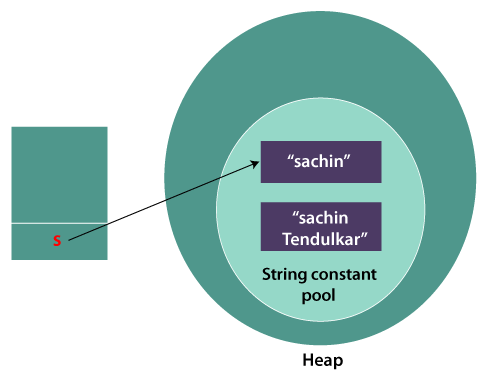Why Are Strings Immutable in Java? Comprehensive Guide for Beginners
Why Are Strings Immutable in Java? Comprehensive Guide for Beginners
Blog Article
Immutable Strings: A Secret Element in Ensuring Data Uniformity and Dependability
In the world of data monitoring, the value of immutable strings can not be overemphasized. These unvarying sequences of characters play a crucial duty in upholding the stability and accuracy of details within systems. By maintaining a state of immutability, information consistency is guaranteed, cultivating a structure of dependability whereupon important processes count. The principle of unalterable strings transcends simple formality; it is a cornerstone in the complicated web of data governance. As we check out the advantages, implementation strategies, and useful applications of immutable strings, a more clear image emerges of their essential nature in guarding the electronic landscape.
The Concept of Unalterable Strings
Unalterable strings, an essential idea in shows, describe strings that can not be changed once they are created. In essence, once a string value is designated, any type of procedure that appears to customize the string actually produces a brand-new string. This immutability ensures data consistency and dependability in applications, as it protects against unanticipated adjustments to the original data.
Benefits in Information Uniformity

Information uniformity is essential in different facets of software application advancement, including data source monitoring, multi-threaded environments, and distributed systems (Why are strings immutable in Java?). Immutable strings add substantially to achieving this uniformity by preventing information corruption because of concurrent access. In situations where several procedures or threads communicate with the very same data concurrently, immutable strings function as a guard against race problems and synchronization concerns
In addition, the immutability of strings simplifies debugging and testing procedures. With immutable strings, developers can trust that once a string is set, it will remain unchanged, making it much easier to map the source of errors and making certain that examination situations create regular outcomes. This reliability in data managing inevitably brings about extra durable and steady applications.

Executing Unalterable Strings
Making sure the immutability of strings requires a thoughtful technique to their application in software program advancement. When a string item is developed, one key technique is to develop string classes in a means that protects against alterations. By making strings unalterable, developers can enhance data uniformity and dependability in their applications.
To apply immutable strings effectively, programmers must favor producing brand-new string items rather than changing existing ones. This technique makes sure that as soon as a string is assigned a value, it can not be changed. Furthermore, any kind of operation that shows up to customize the string needs to produce a brand-new string with the wanted changes rather than changing the initial.
In addition, using unalterable strings can simplify concurrency monitoring in multi-threaded environments. Given that unalterable strings can not be altered after creation, they can be safely shared among several strings without the risk of information corruption.
Duty in Reliability Assurance
In software application development, the application of unalterable strings plays an essential role in ensuring the integrity of data operations. Immutable strings, as soon as produced, can not be changed, making sure that the information they represent continues to be consistent throughout the application's execution. This immutability residential property offers a degree of assurance that the information being refined will not be unintentionally transformed, resulting in unforeseen outcomes or errors in the system.
By integrating immutable strings right into software program style, designers can improve the dependability of their applications by decreasing the threats related to mutable data - Why are strings immutable in Java?. Unalterable strings help in protecting against information corruption or unintended adjustments, which can be particularly critical when Related Site taking care of sensitive information or when data stability is extremely important
Furthermore, making use of immutable strings simplifies simultaneous processing, as multiple threads can securely access and share string data without the danger of one string modifying the web content while an additional reads it. This aspect contributes significantly to the total integrity of the software program system, making sure constant and predictable actions in data taking care of operations.
Applications and System Integration
The smooth assimilation of unalterable strings right into different applications and systems is critical for guaranteeing durable data consistency and integrity throughout diverse technological atmospheres - Why are strings immutable in Java?. Immutable strings play a critical duty in enhancing the honesty of information exchanges and communications within complex software environments. By including unalterable strings right into applications, designers can alleviate the dangers connected with information meddling, unauthorized adjustments, and unintentional changes, therefore fortifying the total safety and security stance of the system
In the context of system integration, unalterable strings act as a foundational aspect for developing secure interaction networks and promoting smooth information transfers in between various components. Their immutable nature makes certain that data sent between systems stays unmodified and verifiable, minimizing the possibility of variances or mistakes that could compromise the stability of the entire system. Furthermore, immutable strings can enhance interoperability between inconsonant systems by offering a standard style for information representation, making it possible for more effective information processing and exchange procedures throughout interconnected platforms. By taking on unalterable strings in applications and system integration processes, organizations can strengthen their data infrastructure and promote the integrity and consistency of their information assets.
Conclusion
To conclude, unalterable strings play a vital role in maintaining information uniformity and reliability in numerous applications click this link and system assimilations. By guaranteeing that strings can not be changed when produced, the integrity of information is protected, lowering the risk of variances and mistakes. Executing immutable strings can considerably enhance the reliability of systems, inevitably bring about even more accurate and dependable information processing.

Report this page